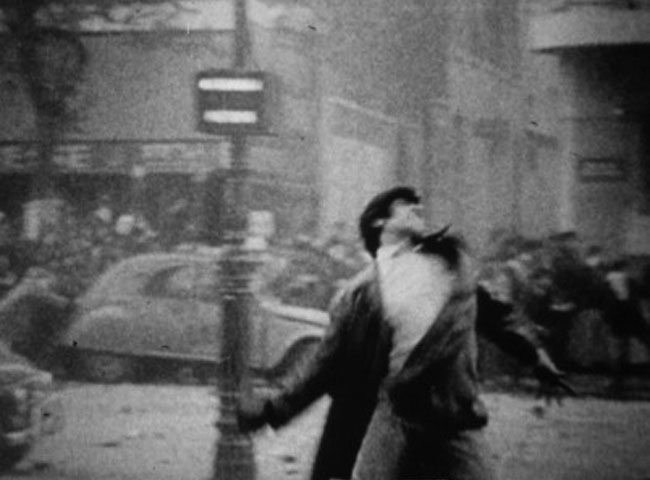Dans l'intense maintenant
-
Réalisé par João Moreira Salles • Écrit par João Moreira Salles
-
Brésil • 2017 • 127 minutes • Archives • Couleur et Noir & Blanc
- Réalisation :
João Moreira Salles - Écriture :
João Moreira Salles - Son :
Denilson Campos - Montage :
Eduardo Escorel, Lais Lifschitz - Musique originale :
Rodrigo Leão
- Production (structure) :
VideoFilmes - Ayant droit :
VideoFilmes
- N° ISAN :
non renseigné
Résumé
En 1966, en plein chamboulement culturel de la Chine, la mère du réalisateur a capturé sur pellicule ses impressions du pays et ses habitants. Quarante ans plus tard, son fils a découvert ses films. Il commente les images prises par sa mère enthousiaste en citant les impressions de l'auteur italien Alberto Moravia, qui a aussi voyagé en Chine et a pu observer étroitement les politiques Maoïstes. Le voyage de sa mère pendant la première année de la Révolution culturelle donne aussi un point de départ pour João Moreira Salles à l'exploration d'autres sociétés en plein bouleversement. En utilisant des images d'archives, il dissèque et analyse le coup d'État brésilien de 1964 et la fin du Printemps de Prague en août 1968. Il revient aussi - à plusieurs reprises - sur les émeutes Parisiennes de mai qui ont trouvé "une star révolutionnaire" et un médiateur entre Paris et Berlin en la personne de Daniel Cohn-Bendit. Un essai et en même temps une exploration personnelle des histoires parallèles des révolutions à Prague, en France et au Brésil - et leur échec. En juxtaposant des séquences d'amateurs et des archives, le film réussit à pointer du doigt des connexions entre les sources de ces images et leurs contextes politiques.
In 1966, whilst on a cultural tour of China, the director’s mother captured on film her impressions of the country and its people. Forty years later, her son discovered her material. He comments on the images taken by his enthusiastic mother by quoting the impressions of Italian author Alberto Moravia, who also travelled through China and was able to closely observe Maoist policies. His mother’s journey during the first year of the Cultural Revolution also provides a starting point for João Moreira Salles’ exploration of other societies in the midst of upheaval. Making use of archive images, he dissects and analyses the Brazilian coup of 1964 and the end of the Prague Spring in August 1968. He also returns – repeatedly – to the Parisian riots in May which found a "star" revolutionary and mediator between Paris and Berlin in the shape of Daniel Cohn-Bendit. An essayistic and at the same time personal exploration of the parallel stories of revolution in Prague, France and Brazil – and their failure. By juxtaposing amateur footage and archive material the film succeeds in pointing out connections between the sources of these images and their political contexts.
Mot(s)-clé(s) thématique(s)
Sélections et distinctions
- 2017 • RIDM - Rencontres Internationales du Documentaire de Montréal • Montréal (Canada) • Sélection officielle
- 2017 • Festival du cinéma brésilien de Paris • Paris (France) • Section Documentaires
- 2017 • Cinéma du réel • Paris (France) • Prix International de la SCAM, Prix des Bibliothèques & Prix de la Musique Originale
- 2017 • Festival international du film de Berlin - Berlinale • Berlin (Allemagne) • Panorama Documentaires
Comment avoir accès au film ?
-
Édition DVD
- Il n'existe pas d'édition DVD à notre connaissance
-
Accès VOD
- Il n'existe pas d'accès en VOD à notre connaissance
- Distribution
- Aide sur les moyens d'accéder à un film
